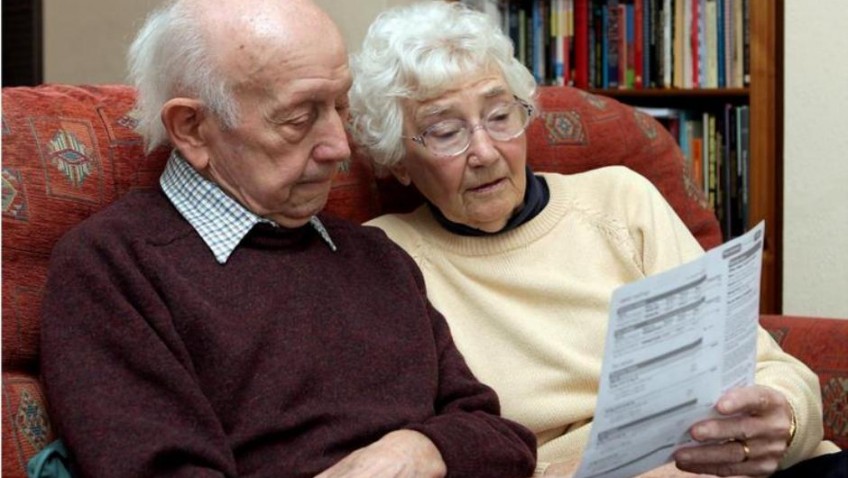Almost two thirds of Scots in their 60s have yet to pay off loans on their home, worrying new figures revealed yesterday.
Research released by charity Age Scotland Enterprises shows that 383,000 people in this age group have over 20 per cent of their mortgage still outstanding.
The survey also found that more than half a million Scots aged over 50 have yet to pay off their home loans with an average estimated shortfall of 26 per cent.
And a total of 630,600 people in this age group have an estimated total mortgage debt amounting to over £21.3bn.
To repay the balance, 24 per cent of those over 50 say they would sell their home, while over a fifth admit they have no idea how they will complete repayments.
And over a quarter of people still have children living with them rent free.
Meanwhile, a recent report by Age Scotland about housing concerns for older people revealed that 47 per cent of over 50s confess to feeling stress, anxiety, confusion, embarrassment and fear due to a lack of understanding about money.
And nearly a third of over 50s — 556,00 people — are worried about making ends meet.
This was seen as a more pressing concern than becoming a victim of crime, loneliness, or even death.
Logan Steele, General Manager of Age Scotland Enterprises, said: “This research highlights the ongoing financial pressures facing a generation that have a combined mortgage debt of £21bn and are either already retired or approaching retirement.
“Housing debt can often be at the heart of people’s financial assets, so it is interesting and perhaps concerning that with pension reform arriving soon, so many older people are considering dipping into their pension pots to pay off their mortgages.
“Pensions are intended to provide people with the means and security to live in their old age, so the impact of such decisions could be far reaching.
“It is common for older people to consider their children and grandchildren as well as their own future when weighing up to the practicalities of retirement.
“Striking the right balance can be difficult and can lead to financial hardship. We’d encourage people to fully consider all options and their implications from downsizing to equity release before taking any action.”
For Audrey Reid, 57, the worries of paying off a mortgage are all too real.
The service manager for oil giant Shell works five days a week in Aberdeen and has a home in Balloch, West Dunbartonshire.
She found herself having to take on a mortgage a few years ago following a divorce.
The mum-of-three intends to keep working until she is 67 in order to finish paying the mortgage off — a scenario she could barely imagine 20 years ago.
She said: “Due to my circumstances I had to actually take out a mortgage late on in life.
“I had to take a mortgage out on my own and start again. I’ve had my home in Balloch for six years.
“I’m surprised I’m still paying it off — it’s not what I expected.
“My circumstances were very much dictated by the fact I was divorced. By this age I would have expected the mortgage would be paid off.
“I will still have the mortgage up until I’m 67. I have no other option. I’m still going to be working to pay it off.”
Audrey, who was married for 24 years before getting divorced 17 years ago, believes the reason for the high number of over 50s yet to pay off their mortgage is “very much” due to marriage breakups.
She added: “I even know friends in the same position. In my age group you will find more divorces than ever before.
“This age group from 50 to my age there are people still having to get mortgages — male or female.
“People don’t actually put up with their partners like they did years ago. There’s a lot who have had to go out and take another mortgage.
“It’s affecting a large number of people. It’s reverting back to an awful lot of people renting rather than taking the responsibility on of a mortgage.
“All you’re doing with a mortgage is making a saving plan for children.”
She said she knew a lot of people choosing to rent instead of buying, but there were not enough “good quality rental properties out there in areas you would want to live in”.
Audrey added: “When I was married I was in a very affluent area and I didn’t want to take my children out of that area and that was the reason why I wanted to take a mortgage.”
Another issue for Audrey was that while married she decided not to work, as her husband was in a well-paid job with Royal Bank of Scotland, with mortgage and pension options through the company.
But after her divorce she realised she would have to go back to work, and due to not working for so long, had no pension of her own.
She said: “I have had to work. I didn’t actually have to work when I was married. I had to go out to work to actually get a house in an area I wanted to live.
“I don’t have a pension and now anyone over 50 is going to have to work until their 67.
“People who are in the same position as me will have to pay their mortgage. A lot of companies are actually giving you a mortgage up until you’re 70.”
A Scottish Government spokeswoman said: “The Scottish Government is committed to improving the lives of Scotland’s older people and we work closely with Age Scotland in seeking to do so.
“We are also protecting household resources through free personal care for the elderly, the scrapping of prescription charges, free eye examinations, concessionary bus passes as well as mitigating the effects of the bedroom tax.
“The Scotland’s Financial Health Service website has been created by the Scottish Government’s agency Accountant in Bankruptcy to signpost people to credible organisations which offer information and advice on debt, managing money, housing, homelessness and ethical lending.”
By Pamela Paterson





